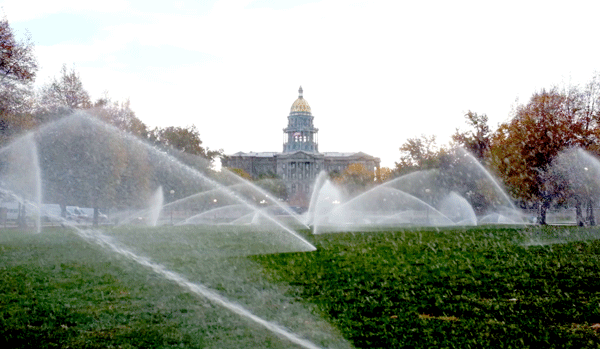The longer days combined with spring snowstorm moisture might mean your grass lawn is starting to turn green.
If that lawn is in Denver (or you're a Denver Water user outside the city), here's your reminder that keeping that grass green and lush comes with some watering rules, which run from May 1 - Oct. 1.
Here are the outdoor watering rules for Denver:
- You're only allowed to water your lawn before 10 a.m. and after 6 p.m. (those are the cooler hours of the day)
- You cannot water more than three days per week
- Do not allow water to pool in gutters, streets and alleys
- Do not waste water by letting it spray on concrete and asphalt (please do not water the sidewalk)
- Do not irrigate while it is raining or during high winds
- If you've got a leaky sprinkler system, you must repair it within 10 days
- If you want to wash your car, use a hose nozzle with a shut-off valve
Why does Denver have watering rules?
Some utilities tell customers when and how much they can water when drought conditions are bad and reservoir levels are concerning. A mandate like this is usually considered the first stage of water use restrictions.
But Denver Water institutionalized summer watering restrictions nearly 20 years ago that are the norm regardless of statewide drought and reservoir conditions.
"We felt years ago that we needed to get ahead of this," said Todd Hartman with Denver Water. "Utilities that depend on reservoirs and streams like they all are, are seeing the same things we are. Reduction in snowpack, they're seeing earlier melt off and water evaporation and dry soils that drink up a lot of water in the early part of the seasons so it never makes it into a reservoir."
Those changes are partly due to human-caused climate change. It was the 2002 drought, one of Colorado's worst on record, that led Denver Water to make these lawn watering rules standard. Since then, Hartman said other utilities in Aurora, Colorado Springs and Centennial have also made summer restrictions the norm.
Between 2006 and 2016, Denver Water use decreased by an average of 22 percent per customer across the system, Hartman said. He attributes that drop to reductions in outdoor use and more efficient indoor use.
Denver's stage one water restrictions limit outdoor watering to 1 to 2 days a week, last used during the drought of 2013. Hartman said Denver Water is keeping a close eye on conditions, but right now, reservoir levels look OK and the outdoor watering limits aren't needed.
What if someone is breaking the watering rules?
Denver doesn't pass out tickets to watering offenders unless "we found that to be necessary if things became more difficult, that's certainly something we'd consider," Hartmand said. But the big focus is on education. Denver Water will talk to a resident if someone has reported a concern, like pooling water in gutters or if they see a sidewalk instead of a tree getting watered.
Denver Water also flags customers who use an unusually large amount of water.
"They'll get communication from us, gently talking to them about the fact that they might want to look at how their water's being used outdoors," Hartman said.
Some Colorado cities, like Aurora and Boulder, will pay you to rip out a grass lawn and replace it with water-wise plants that pollinators like bees and butterflies would appreciate. So would your water utility.













